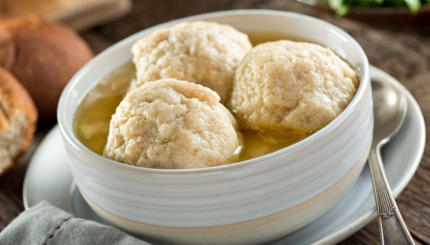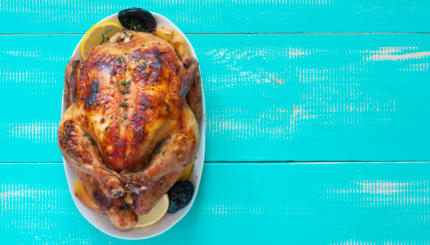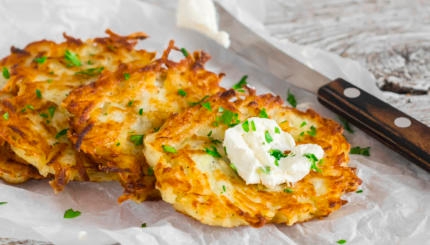I believe the time has come for us to reconsider the question of whether we should continue to consume animal flesh as food. Our tradition has always contained within it a certain pro-vegetarian bias, even though it has provided for the eating of meat. In the ideal state of Eden, according to the Bible, humans ate only plants; we and the animals together were given the plants as food. Only after the expulsion from Eden, when the urge overwhelmed humans and led them toward evil, did the consumption of flesh begin.
The very first set of laws given to humanity sought to limit this evil by forbidding the flesh of a still-living creature, placing a limit on acts of cruelty or terror relating to the eating of animal flesh. The Torah’s original insistence that domestic animals could be slaughtered only for purpose of sacrifice, an offering to God needed to atone for the killing, was compromised only when the Book of Deuteronomy wanted to insist that sacrifice be offered in Jerusalem alone.
Realizing that people living at great distance could not bring all their animals to the Temple for slaughter, the “secular” slaughter and eating of domestic animals was permitted. Even then, the taboo against consuming blood, and later, the requirement to salt meat until even traces of blood were removed, “for the blood is the self” of the creature, represent a clear discomfort with the eating of animal flesh.
Most significantly, the forbidding of any mixing of milk and meat represents a proto-vegetarian sensibility. Milk is the fluid by which life is passed on from generation to generation. It may not be consumed with flesh, representing the taking of that life in an act of violence. The fluid of life may not be mixed with that of death. As the Torah says of the hewn-stone altar, “For you have waved your sword over it and have profaned it.”
The reasons for acting upon this vegetarian impulse in our day are multiple and compelling, just as compelling, I believe, as the reasons for the selective taboos against certain animals must have been when the Community of Israel came to accept these as the word of God. This is what we mean, after all, when we talk about a mitzvah being “the word of God” or “God’s will.” It is a form of human expression or a way of acting that feels compellingly right. This rightness has both a moral and a spiritual dimension; it is an expression of values we choose, but it also makes a more profound statement about who we are. We then come to associate it with divinity, and it becomes a vehicle through which we express our spiritual selves.
With the passage of time, origins are shrouded in mystery, and the form becomes the “will of God.” Israelites of ancient times felt that way about the taboos widely current in their society against the consumption of certain animals that they saw as repulsive, against the eating of blood, the mixing of milk and meat, and so forth. They associated this series of taboos with the God of Sinai. Over the centuries, kashrut as we know it became a mitzvah, a way in which Jews are joined to God.
Our situation has certain important parallels to this one. We are urgently concerned with finding a better way to share earth’s limited resources. We know that many more human lives can be sustained if land is used for planting rather than for grazing of animals for food. We are committed also to a healthier way of living and are coming to recognize that the human is, after all, a mostly vegetarian species. But for us as Jews, the impulse is largely a moral and religious one.
We have a long tradition of abhorring violence. Cruelty to animals has long been forbidden by Jewish law and sensibilities. Our tradition tells us that we must shoo a mother bird away form the nest before we take her eggs so that she does not suffer as we break the bond between them. We are told that a mother and her calf may not be slaughtered on the same day. The very next step beyond these prohibitions is a commitment to a vegetarian way of living.
We Jews in this century have been victims of destruction and mass slaughter on an unprecedented scale. We have seen every norm of humanity violated as we were treated like cattle rather than human beings. Our response to this memory is surely a complex and multitextured one. But as we overcome the understandable first reactions to the events, some of us feel our abhorrence of violence and bloodshed growing so strong that it reaches even beyond the borders of the human and into the animal kingdom. We Jews, who always looked upon killing for sport or pleasure as something alien and repulsive, should now, out of our own experience, be reaching the point where we find even the slaughter of animals for food morally beyond the range of the acceptable.
If Jews have to be associated with killing at all in our time, let it be only for the defense of human life. Life has become too precious in this era for us to be involved in the shedding of blood, even that of animals, when we can survive without it. This is not an ascetic choice, we should note, but rather a life-affirming one. A vegetarian Judaism would be more whole it its ability to embrace the presence of God in all of Creation.
Reprinted with permission from Seek My Face, Speak My Name: A Contemporary Jewish Theology, © 1992 by Jason Aronson, Inc.
Torah
Pronunced: TORE-uh, Origin: Hebrew, the Five Books of Moses.



